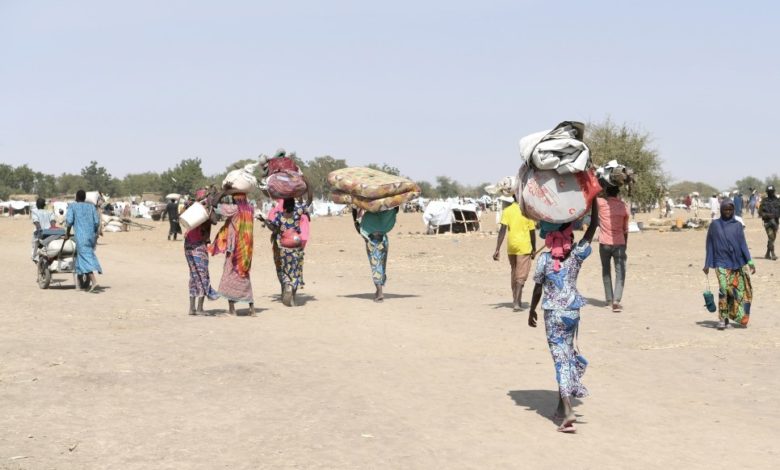Boko Haram May Have Used Child Suicide Bombers In Cameroon Attack

Accounts of people who witnessed a recent attack by Boko Haram fighters in a Cameroonian displacement camp suggest that child suicide bombers were used, Human Rights Watch (HRW), an international non-governmental organisation reports.
The incident, which led to the death of 17 people and immediately displaced over 1,500 others, took place between August 1 and 2 in the town of Nguetechewe. At least 16 people sustained injuries and among those who lost their lives were five children and six women.
HRW shared its findings on Tuesday after interviewing 14 witnesses and victims of the attacks, alongside aid workers, rights advocates, and one local medical worker.
“Available information from witnesses and independent sources indicates that the suicide bombers were children,” the NGO said, but added that it could not confirm the finding.
“Witnesses said that 20 to 30 fighters whom they recognised as Boko Haram because of the way they dressed and spoke, enteredNguetechewe on foot late on August 1, evading detection from local gendarmes. They attacked community volunteer guards and members of a local vigilante group,” it reported.
“Witnesses reported hearing two loud consecutive explosions as they fled. They said they believe the explosions were caused by two suicide bombers who infiltrated groups of fleeing civilians, then detonated explosive vests. The blasts killed 12 civilians.”
According to the United Nations Children’s Fund (UNICEF), between January and August 2017, 83 children, often under 15 years, were used as “human bombs” in northeast Nigeria. Out of them, 55 were girls and “one was a baby strapped to a girl”. The following year, 48 children were used. And, last year, in a terrorist attack in Konduga, a village in Borno, two girls and a boy, believed to have been sent by Boko Haram, carried out a bombing that killed at least 30 people.
Under international humanitarian law, the use of children under the age of 18 as soldiers or to participate in hostilities is prohibited. “Armed groups distinct from the armed forces of a country should not, under any circumstances, recruit or use in hostilities anyone under 18,” states the Optional Protocol to the Convention on the Rights of the Child adopted by the UN in 2000.
About the Nguetechewe attack, HRW’s senior Africa researcher, Ilaria Allegrozzi, said it appeared to have been designed to maximise civilian casualties. “Using apparent children as suicide bombers to attack displaced people is a grossly repugnant war crime,” she noted.
“Attacking civilians, including those who have already been forced from their homes, is beyond reprehensible. Securing Nguetchewe is a step in the right direction, but Cameroon’s government needs to adopt additional measures, including a more careful deployment of security forces to better protect civilians who remain at grave risk.”
A 32-year-old woman, who had recently sought refuge in Nguetchewe after fleeing her home village of Mebori, recalled that gunshots from the terrorists woke her up.
“I just left my shelter and ran outside. Boko Haram fighters were firing all over the place, bullets were flying. While I was running, I was shot. A Boko Haram fighter shot me in my right hand,” she told HRW.
“I did not stop running and I forced myself not to shout or cry. As I kept running through a millet field, I heard a very strong explosion. It was terrifying. I lay down and shortly after I heard a second explosion. I don’t remember much after. Gendarmes rescued me and the following morning the military took me to the hospital in Koza.”
A local activist told the organisation that the number of gendarmes (paramilitary police officers) at the site was inadequate to protect the people against terrorists.
“Boko Haram knows the area and the territory well. They know where to enter and escape. They use suicide bombers, and often they are children or women, so they can go unnoticed,” the activist observed.
“If the authorities do not deploy more security forces in our area, they will be failing in their fundamental duty to protect their people. They should prevent Boko Haram from targeting civilians again and protect the displaced communities from further attacks.”
HRW noted that the activities of Boko Haram in Cameroon have led to the displacement of over 322,000 people since 2014, many of whom now live in “so-called spontaneous sites or with hosting families”. Many of these sites, numbering over a hundred in the Far North region, have no military protection. Asides local victims of terrorist attacks, the country also hosts about 116,000 refugees from Nigeria.
Support Our Journalism
There are millions of ordinary people affected by conflict in Africa whose stories are missing in the mainstream media. HumAngle is determined to tell those challenging and under-reported stories, hoping that the people impacted by these conflicts will find the safety and security they deserve.
To ensure that we continue to provide public service coverage, we have a small favour to ask you. We want you to be part of our journalistic endeavour by contributing a token to us.
Your donation will further promote a robust, free, and independent media.
Donate HereStay Closer To The Stories That Matter




